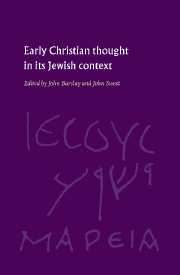Book contents
- Frontmatter
- Contents
- List of contributors
- Preface
- List of works by Morna D. Hooker
- List of abbreviations
- Chapter 1 Introductory Essay
- I THE SOCIAL CONTEXT OF EARLY CHRISTIANITY
- II SOME EARLY CHRISTIAN SOURCES
- Chapter 4 Jesus
- Chapter 5 Matthew
- Chapter 6 Mark
- Chapter 7 Luke–Acts
- Chapter 8 John
- Chapter 9 Paul
- Chapter 10 Deutero-Pauline letters
- Chapter 11 Hebrews
- Chapter 12 Revelation
- Chapter 13 Other early Christian writings: ‘Didache’, Ignatius, ‘Barnabas’, Justin Martyr
- III SOME EARLY CHRISTIAN THEMES
- Index of names
- Index of subjects
- Index of texts
Chapter 4 - Jesus
from II - SOME EARLY CHRISTIAN SOURCES
Published online by Cambridge University Press: 22 September 2009
- Frontmatter
- Contents
- List of contributors
- Preface
- List of works by Morna D. Hooker
- List of abbreviations
- Chapter 1 Introductory Essay
- I THE SOCIAL CONTEXT OF EARLY CHRISTIANITY
- II SOME EARLY CHRISTIAN SOURCES
- Chapter 4 Jesus
- Chapter 5 Matthew
- Chapter 6 Mark
- Chapter 7 Luke–Acts
- Chapter 8 John
- Chapter 9 Paul
- Chapter 10 Deutero-Pauline letters
- Chapter 11 Hebrews
- Chapter 12 Revelation
- Chapter 13 Other early Christian writings: ‘Didache’, Ignatius, ‘Barnabas’, Justin Martyr
- III SOME EARLY CHRISTIAN THEMES
- Index of names
- Index of subjects
- Index of texts
Summary
INTRODUCTION
When, in 1973, Geza Vermes published the first of his three major books about Jesus, its title sent shock waves through certain sections of the reading public. Jesus the Jew: the very phrase was polemical, summing up, as only the best titles succeed in doing, the book's content and thrust. Vermes, like a few writers before and a great many since, attempted, by arguing for the essential Jewishness of Jesus, to undermine certain commonplace Christian affirmations. The debate continues.
But, as it continues, it broadens out. We have learnt – not least through the other labours of Vermes himself – just how many-sided was the Judaism of the first century. The present writer, having in a recent work expanded what had been a single chapter on first century Judaism into five chapters totalling some two hundred pages, was taken to task by a reviewer for making things to simple, for missing out too much data. The more we learn about the Jewish world of the first century, the more we are aware of its multiple diversities.
Nevertheless, there is still clearly something we can call ‘first century Judaism’. We would not know, otherwise, what this thing was whose multiple diversity we were so firmly asserting. This is, of course, yet another low-grade re-run of the old debate between Platonists and Aristotelians, which emerges in all sorts of contexts.
- Type
- Chapter
- Information
- Early Christian Thought in its Jewish Context , pp. 43 - 58Publisher: Cambridge University PressPrint publication year: 1996
- 1
- Cited by



